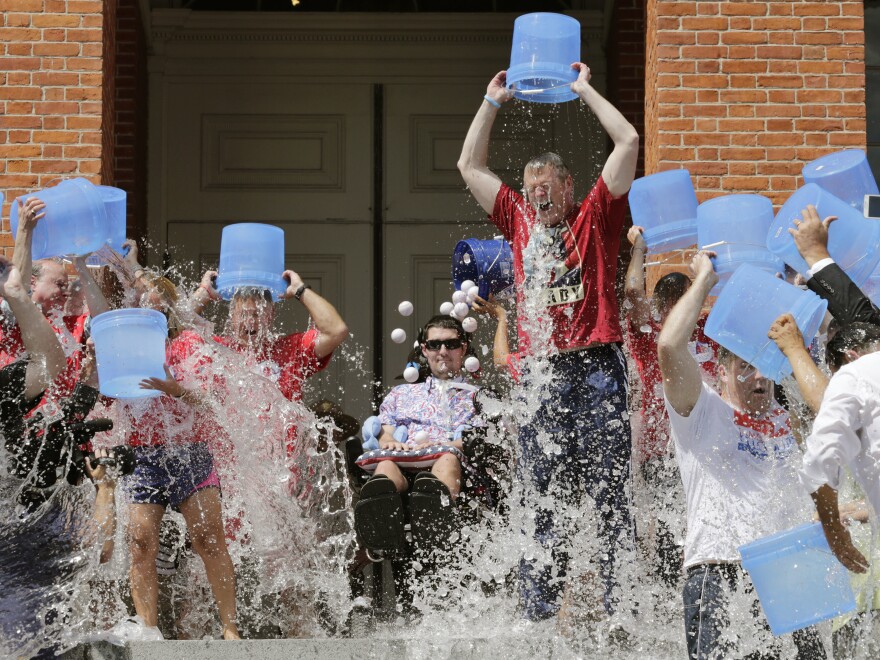Pete Frates, the former Boston College baseball star whose battle with amyotrophic lateral sclerosis inspired the viral Ice Bucket Challenge and raised millions for ALS research, died Monday at age 34.
"Pete was an inspiration to so many people around the world who drew strength from his courage and resiliency," his family wrote in a statement, released by Boston College.
"A natural born leader and the ultimate teammate, Pete was a role model for all, especially young athletes, who looked up to him for his bravery and unwavering positive spirit in the face of adversity. He was a noble fighter who inspired us all to use our talents and strengths in the service of others."
Our hearts are heavy as we mourn the loss of former @BCBirdball captain Pete Frates ’07, whose heroic battle with ALS served as the inspiration for the #IceBucketChallenge, died at the age of 34.
— Boston College (@BostonCollege) December 9, 2019
In Memoriam: https://t.co/09wI6Nk5OL pic.twitter.com/faTctiu1jE
At Boston College, Frates set baseball team records, once hitting a grand slam, a three-run homer and a double in a single game. After college, he played professional baseball in Germany and coached young players before returning home to sell insurance.
Up to bat during a men's league baseball game in 2011, Frates was struck on his left wrist by a fastball. The injury led to a diagnosis of amyotrophic lateral sclerosis, also known as ALS or Lou Gehrig's disease — a neurodegenerative disease that affects nerve cells in the brain and the spinal cord.
Frates did not invent the Ice Bucket Challenge, but he helped it gain national attention. The idea originated with another ALS patient, Patrick Quinn, whom Frates met online and later befriended.
The typical Ice Bucket Challenge looked like this:
Often outfitted in bathing suits or wrapped in a towel, participants would get in front of a video camera and then dump a big bucket of ice water on their heads. The soaked participant would then nominate friends to take on the challenge and make a donation to ALS research.
Frates spread the word on social media and got high-profile participants involved, like New England Patriots star Tom Brady and Red Sox owner John Henry. Before long, celebrities like George W. Bush, Oprah Winfrey, Lady Gaga, Bill Gates and Steven Spielberg were making their own Ice Bucket Challenge videos throughout the summer of 2014.
According to the Boston Globe, the challenge is estimated to have raised between $160 million and $220 million for ALS research. In 2016, a global gene sequencing effort, funded by Ice Bucket Challenge donations to the ALS Association, led to the discovery of a new ALS gene.
"Our hearts go out to Frates family and Boston community," the ALS Association wrote on Twitter. "Pete Frates changed the trajectory of ALS forever and showed the world how to live with a fatal disease. His efforts to lead the Ice Bucket Challenge had a significant impact on the search for treatments and a cure for ALS."
Our hearts go out to Frates family and Boston community. @PeteFrates3 changed the trajectory of ALS forever and showed the world how to live with a fatal disease. His efforts to lead the Ice Bucket Challenge had a significant impact on the search for treatments and a cure for ALS
— The ALS Association (@alsassociation) December 9, 2019
Boston College spokesman Jack Dunn wrote in a statement that Frates embodied the university's values: courage, integrity, selflessness and a drive to help others.
"He accepted his illness and devoted the remaining years of his life to raising awareness of ALS and helping to raise money for a cure," Dunn wrote. "He is a role model for all BC students and a beloved figure on our campus."
Boston Mayor Marty Walsh, who made his own Ice Bucket Challenge video back in 2015, weighed in on Twitter.
Pete, you changed our city & our country for the better and made a difference in the lives of countless people. You helped us remember that we're all one family & we have to look out for one another. There's no telling how much good you've set in motion. RIP, my friend. #GoEagles https://t.co/aPjfqWQDvm
— Mayor Marty Walsh (@marty_walsh) December 9, 2019
"Pete, you changed our city & our country for the better and made a difference in the lives of countless people," he wrote. "You helped us remember that we're all one family & we have to look out for one another. There's no telling how much good you've set in motion."
A year after his diagnosis, Frates was interviewed by the Boston College student newspaper, The Heights. Back then, he said his newfound role as an advocate "gives me another reason to get out of bed every day. Being part of something bigger than yourself is one of the best things you can do."
Copyright 2022 NPR. To see more, visit https://www.npr.org.




